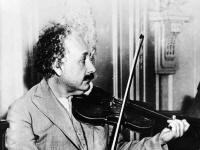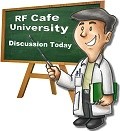|
We technically
oriented types often think of those with an artsy-fartsy bent as ones who run for
the tall grass when topics of science and/or mathematics arise. Other than engineers,
scientists, financiers, etc., I would say in most cases it is justified - but not
always. In the September 2013 edition of
Strings magazine, an article titled, "How the Violin Altered
Our View of the Universe" appeared where author
Paul Stein, a violinist, educator, and member of the Los Angeles
Philharmonic, evidenced a very good grasp of science and math principles. The very
decision to pen such an article had to have been born of a knowledge and comfort
with the aforementioned. A subtitle of, "Physicist & violinist Albert Einstein's
cosmic orchestra resonates with the music of the spheres," proves familiarity of
Isaac Newton's "Music of the Spheres," (Musica Universalis) Einstein's competence
with a violin, and the concept of resonance. Just because a musician can use the
word 'resonance' in a sentence does not necessarily mean he/she can tell you what
it really means (trust me, I know).
 It is true
that Mr. Stein's vocation as an educator increases the likelihood that he understands
the scientific and mathematical underpinnings of musical instrument design and the
elegance of music theory. I watched about 8 hours of music theory (DVD instruction
set) from a Ph.D. professor at a leading conservatory, where he significantly challenged
my own understanding of harmonics and resonance, scales, tempo, and many other technical
realms. If you are a musician, do you really understand the
Circle of
Fifths and why using it for, among other things, transposing the key of a music
piece actually works? When the light bulb turned on for me, I felt as gratified
as when I learned how to calculate the escape velocity of a massive body in physics
class. Even so, my understanding is still woefully below that of an accomplished
classically trained musician. It is true
that Mr. Stein's vocation as an educator increases the likelihood that he understands
the scientific and mathematical underpinnings of musical instrument design and the
elegance of music theory. I watched about 8 hours of music theory (DVD instruction
set) from a Ph.D. professor at a leading conservatory, where he significantly challenged
my own understanding of harmonics and resonance, scales, tempo, and many other technical
realms. If you are a musician, do you really understand the
Circle of
Fifths and why using it for, among other things, transposing the key of a music
piece actually works? When the light bulb turned on for me, I felt as gratified
as when I learned how to calculate the escape velocity of a massive body in physics
class. Even so, my understanding is still woefully below that of an accomplished
classically trained musician.
Stein recounts some of Einstein's exchanges with noted contemporaries like composer
and playwright Rabindranath Tagore (I hadn't heard of him, either) regarding
the correlation of music, physics, and philosophy. What piqued my interest in Stein's
usage of math was a paragraph where he chose to use the concept of an argument with
three unknown quantities requiring three equations (lines of thought in this case)
in order to be solved. References to relativity are scattered throughout as well.
You can read the article here if you are interested*.
On a related note (pun intended), Phil Libin, co-founder and CEO of Evernote
software company, wrote an article titled, "And Suddenly, a Symphony of Creativity Is Unleashed," in Inc magazine
relating how his beginning to learn to play the piano at age 41 has altered his
awareness of the parallel factors of musical structure and concepts on everyday
activities. It's a quick read of one page.
While you're there, try, "The West Point Way," to read a surprising report on how author
Bo Burlingham discovered that despite an unimaginable level of constant stress during
four years of military discipline and rigorous college studies, the Cadets are far
and above happier and more positive than any he has encountered on civilian campuses.
No, I am not a musician.
Posted October 8, 2013
|








 "
"
